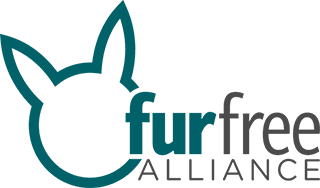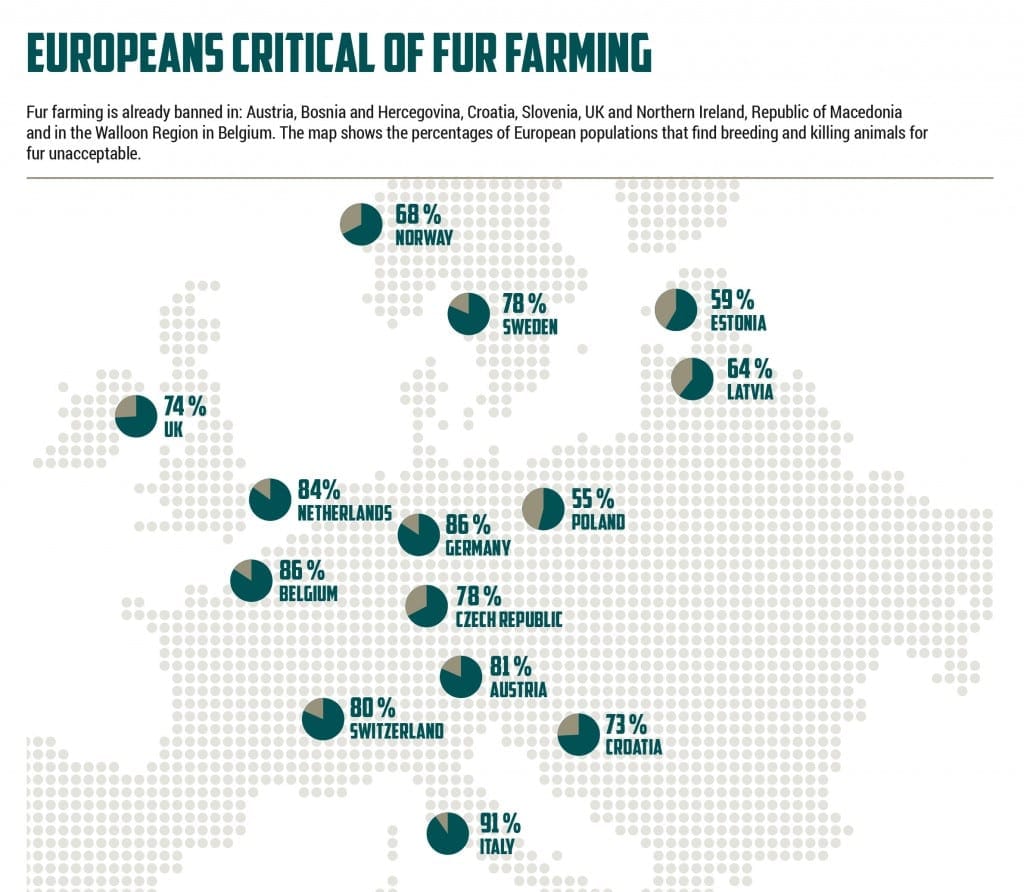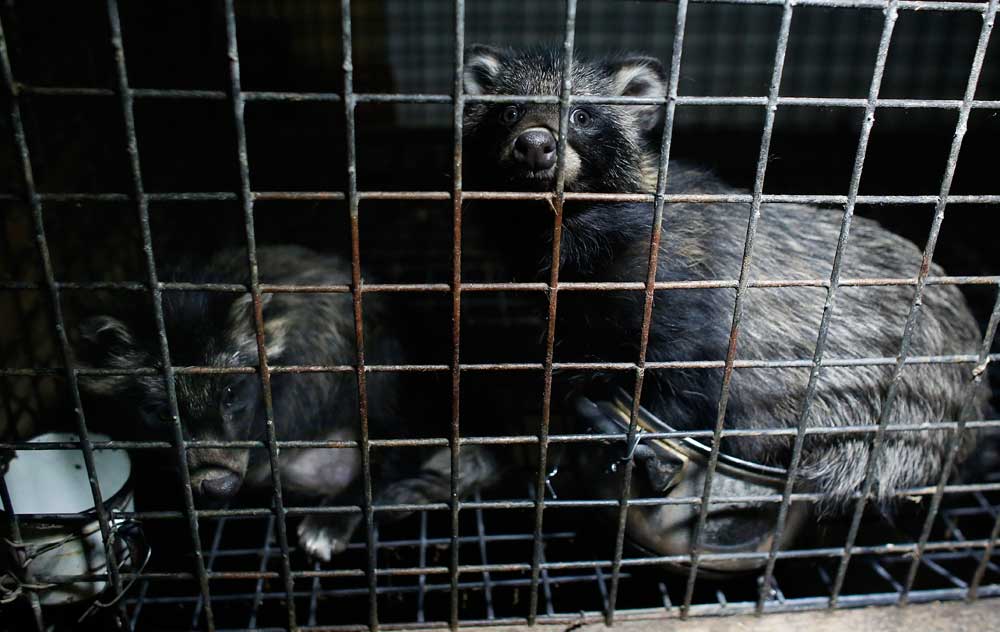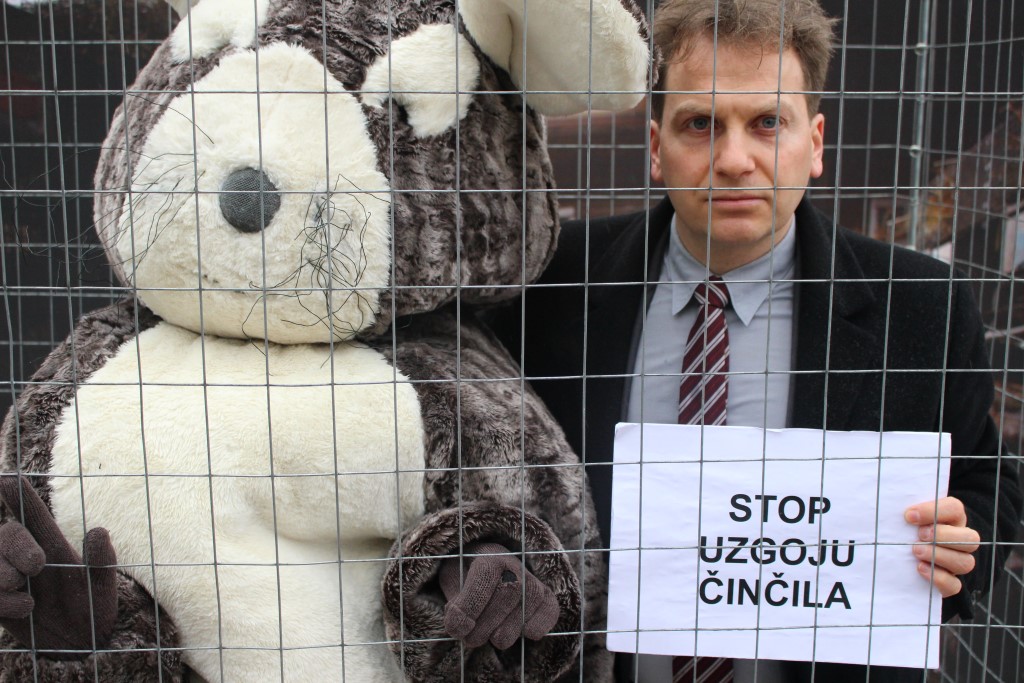
Dutch mink ban verdict sets precedent in Europe
THE NETHERLANDS, 14 FEBRUARY 2016 – The historical verdict of the Dutch court to uphold the mink ban sets a strong precedent for the ethical case against fur farming. The language used by the National Court of Appeals in The Hague is unequivocal; the economical interest of fur farmers is offset by the public interest. The verdict states Dutch mink farmers are sufficiently compensated for their financial loss by the phase-out period of 11 year and the accompanying measures of the new law. The Netherlands is the world’s fourth largest mink producing country with an annual production of around 6 million mink on 160 minks farms across the country.
As appears from what has been stated on the legal precedents of the Law so far (…) the mink farmers had to take into consideration that there would come a time when their activities would be prohibited. (…) this motion did not concern animal welfare as such, but the notion that it is ethically not acceptable to keep animals for the production of fur.
Read the full verdict HERE.
 The ethical argument against the keeping of animals for fur has previously caused several European countries, among which the UK (2000), Austria (2004) and most recently the Belgium region of Walloon (2015), to ban fur farming completely. Fur bans are subject of debate in more and more European members states, and are particularly high on the current political agenda in Belgium and Germany.
The ethical argument against the keeping of animals for fur has previously caused several European countries, among which the UK (2000), Austria (2004) and most recently the Belgium region of Walloon (2015), to ban fur farming completely. Fur bans are subject of debate in more and more European members states, and are particularly high on the current political agenda in Belgium and Germany.
The process of banning fur farming in the Netherlands
On 4 October 2006 member of Parliament Van Velzen submitted a proposed bill, aimed at the prohibition of fur farming. The bill was based on the ethical notion that it is unacceptable to keep fur animals and kill them solely for the purpose of fur production. The bill has led to the law for the prohibition of fur farming which became effective as of 15 January 2013. The law incorporates a phase-out period of 11 years to compensate the mink farmers for the financial damage caused by the ban and to enable them to earn back investments. The law furthermore contains accompanying measures to offer compensation for financial loss due to demolition costs, reinvestments or adversely affected pension provision.
 In May 2014, after a legal challenge of the Dutch Federation of Fur Holders, the Dutch court dismissed the ban and stated the law infringes upon the mink farmers’ right of property, as set out in Article 1 of the First Protocol of the ECHR. The court judged there was a lack of ‘fair balance’ between the demands of the public interests and the protection of the fundamental rights of the fur farmers. The 11-year transitional period was not considered as compensation for this form of regulation, since fur farmers were said to endure future damage during the phase-out period. The court furthermore did not consider the accompanying measures as a form of compensation, since the measures were said to lack clarity on the amounts to be paid and who would be likely to qualify.
In May 2014, after a legal challenge of the Dutch Federation of Fur Holders, the Dutch court dismissed the ban and stated the law infringes upon the mink farmers’ right of property, as set out in Article 1 of the First Protocol of the ECHR. The court judged there was a lack of ‘fair balance’ between the demands of the public interests and the protection of the fundamental rights of the fur farmers. The 11-year transitional period was not considered as compensation for this form of regulation, since fur farmers were said to endure future damage during the phase-out period. The court furthermore did not consider the accompanying measures as a form of compensation, since the measures were said to lack clarity on the amounts to be paid and who would be likely to qualify.
After an appeal of the Dutch state, in November 2015 the National Court of Appeals ruled the new legislation does take the interest of fur farmers sufficiently into account because of the 11-year changeover period. Besides, the court states that the accompanying measures should be considered as a form of compensation. The judge furthermore states that ECHR jurisprudence shows the loss of future income, which the mink farmers said they would endure during the phase-out period, is not protected by article 1 FP, and adds:
It cannot have escaped the mink farmers’ attention that the wearing of fur and the keeping of animals for fur production has been considered to be unethical by a large part of Dutch society for a long time.
Fur bans on the European agenda
Last November, the Intergroup on Welfare and Conservation of Animals met to discuss fur farming in the EU. The meeting included the launch of the new comprehensive and scientific report “The Case Against Fur Factory Farming “(Respect for Animals), in which fur bans are concluded to be the only solution to the serious animal welfare problems in the fur industry. Inez Staarink, Policy Advisor on Agriculture, Nature, Animals and Food – Dutch Parliament, consequently called the MEPs to support bans in EU member states and to prohibit the expansion of fur farms:
“The Netherlands will no longer export fur, but instead we will export bans on fur farming.”
Fur farming is a politically and economically unstable industry, strongly rejected by the majority of European citizens. The Dutch verdict reaffirms we live in a time in which the animals’ interests and needs are taking precedence over the industry’s needs and extreme animal cruelty is no longer accepted.




